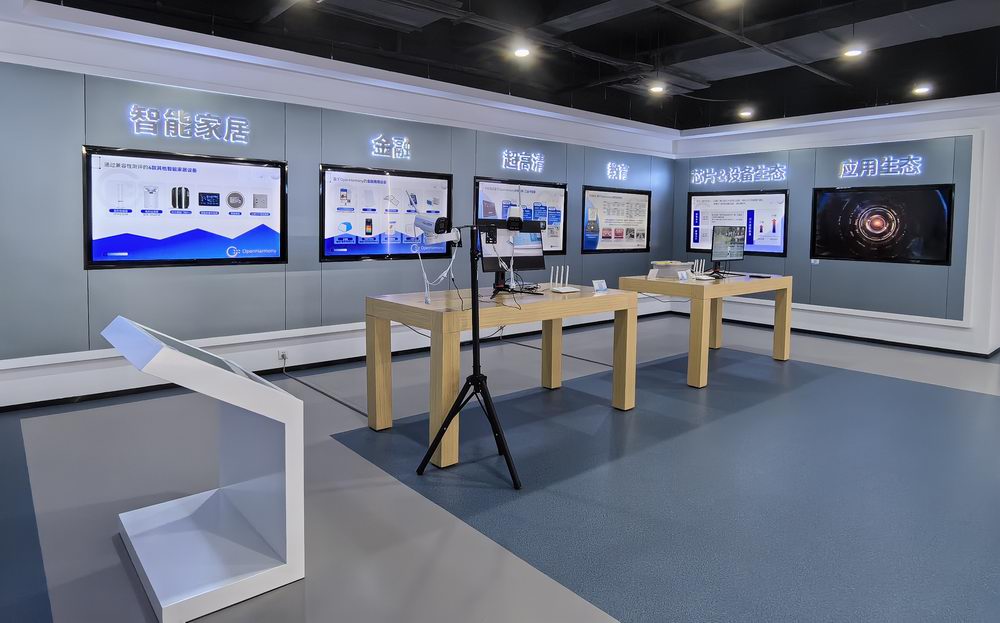Intelligent Manufacturing: Unlocking New Tech

Intelligent manufacturing revolutionizes modern industry by integrating advanced technologies to enhance production processes. This approach leverages innovations like the Internet of Things (IoT), artificial intelligence (AI), and robotics to optimize efficiency and productivity. A study by Deloitte highlights that companies investing in intelligent manufacturing initiatives report up to 12% gains in manufacturing output and labor productivity. As the smart manufacturing market is predicted to grow from $223.6 billion to $985.5 billion by 2032, adopting these technologies becomes crucial for staying competitive. Zhongkai High Tech Zone's cloud platform plays a pivotal role in supporting enterprises by providing access to cutting-edge technologies and facilitating digital transformation.
Key Technologies in Intelligent Manufacturing
Internet of Things (IoT)
The Internet of Things (IoT) plays a crucial role in intelligent manufacturing by connecting devices and systems. IoT enables seamless communication between machines, sensors, and software, creating a network that enhances operational efficiency. This connectivity allows manufacturers to monitor processes in real-time, ensuring that production lines run smoothly.
"Smart manufacturing integrates advanced technologies such as the Internet of Things (IoT), automation, and artificial intelligence (AI) into existing workflows, enabling organizations to optimize performance throughout the manufacturing lifecycle." - Cyngn Blog
IoT significantly impacts data collection and analysis. By gathering vast amounts of data from connected devices, manufacturers can gain valuable insights into their operations. This data-driven approach helps in identifying inefficiencies, predicting maintenance needs, and improving overall productivity.
Artificial Intelligence (AI)
Artificial Intelligence (AI) enhances decision-making processes in intelligent manufacturing. AI technologies, such as machine learning and deep learning, analyze complex data sets to provide actionable insights. These insights enable manufacturers to make informed decisions quickly, optimizing production and reducing downtime.
Future of AI in Manufacturing: AI is rapidly transforming manufacturing, driving significant advancements and efficiencies. AI technologies promise to revolutionize the industry by enhancing efficiency, precision, and innovation.
AI also plays a vital role in predictive maintenance and quality control. By analyzing historical data, AI systems can predict equipment failures before they occur, allowing for timely maintenance. This proactive approach minimizes disruptions and ensures consistent product quality.
Robotics
Robotics automates repetitive tasks in intelligent manufacturing, freeing human workers to focus on more complex activities. Robots perform tasks with high precision and speed, increasing production efficiency. They handle tasks such as assembly, welding, and packaging with accuracy, reducing errors and waste.
Robotics also contributes to precision and efficiency improvements. Advanced robotic systems can work alongside humans, enhancing flexibility in manufacturing processes. These collaborative robots, or cobots, adapt to changing production needs, ensuring optimal performance.
"The automated processes and intelligent systems within a smart factory are continually optimized and informed by artificial intelligence." - SAP
Intelligent manufacturing relies on these key technologies to drive innovation and efficiency. The Zhongkai High Tech Zone cloud platform supports enterprises by providing access to these cutting-edge technologies, facilitating their digital transformation journey.
Cloud Computing
Cloud computing serves as a backbone in intelligent manufacturing by facilitating data sharing and collaboration. Manufacturers use cloud platforms to store and access vast amounts of data, enabling seamless communication across different departments and locations. This connectivity ensures that all stakeholders have access to the same information, promoting transparency and efficiency.
"Smart manufacturing integrates advanced technologies such as the Internet of Things (IoT), automation, and artificial intelligence (AI) into existing workflows, enabling organizations to optimize performance throughout the manufacturing lifecycle." - Cyngn Blog
Real-time monitoring and control become possible with cloud computing. Manufacturers can track production processes from anywhere, allowing for immediate responses to any issues. This capability reduces downtime and enhances productivity, as decisions can be made quickly based on real-time data.
Augmented Reality (AR) and Virtual Reality (VR)
Augmented Reality (AR) and Virtual Reality (VR) find valuable applications in intelligent manufacturing, particularly in training and maintenance. AR provides workers with interactive instructions and visualizations, making complex tasks easier to understand. VR offers immersive training environments, allowing employees to practice skills in a safe and controlled setting.
These technologies also enhance design processes. Designers use AR and VR to visualize products in 3D, enabling them to identify potential issues before production begins. This approach reduces errors and accelerates the design cycle, leading to more efficient manufacturing.
"The automated processes and intelligent systems within a smart factory are continually optimized and informed by artificial intelligence." - SAP
Zhongkai High Tech Zone's cloud platform supports enterprises by providing access to these advanced technologies. Companies in the zone benefit from the platform's resources, which aid in their digital transformation journey. By embracing intelligent manufacturing, businesses can improve efficiency, reduce costs, and enhance product quality.
Applications of Technologies in Manufacturing
Smart Factories
Smart factories represent the pinnacle of intelligent manufacturing, where advanced technologies converge to create highly efficient production environments. These factories utilize real-time monitoring and control systems to ensure optimal performance. Sensors and IoT devices continuously collect data from various points in the production line. This data provides valuable insights into machine performance and product quality.
Real-time Monitoring and Control: Manufacturers use real-time data to make informed decisions quickly. This capability minimizes downtime and enhances productivity. For instance, if a machine shows signs of malfunction, the system alerts technicians immediately, allowing for prompt intervention.
Adaptive Production Lines: Smart factories feature adaptive production lines that adjust to changing demands. These lines can switch between different products with minimal downtime. This flexibility allows manufacturers to respond swiftly to market changes and customer needs.
Supply Chain Optimization
Intelligent manufacturing extends beyond the factory floor, impacting the entire supply chain. By integrating advanced technologies, manufacturers achieve greater efficiency and collaboration with suppliers.
Improved Logistics and Inventory Management: IoT and AI technologies optimize logistics and inventory management. Real-time tracking of shipments and inventory levels ensures that materials arrive just in time for production. This approach reduces storage costs and minimizes waste.
Enhanced Supplier Collaboration: Cloud computing facilitates seamless communication between manufacturers and suppliers. Shared platforms enable real-time data exchange, fostering collaboration and transparency. This connectivity strengthens relationships and streamlines the supply chain.
Customization and Flexibility
In today's market, customization and flexibility are key differentiators. Intelligent manufacturing empowers companies to offer tailored products and services.
On-demand Production Capabilities: Advanced technologies enable on-demand production, allowing manufacturers to produce goods as needed. This approach reduces excess inventory and aligns production with actual demand.
Tailored Product Offerings: Manufacturers leverage intelligent systems to create customized products. AI and robotics allow for precise adjustments in the production process, catering to individual customer preferences.
Scientific Research Findings: Augmented and virtual reality technologies enhance design processes by providing detailed visualizations. Engineers and designers use these tools to refine products before production, ensuring higher quality and faster time to market.
Zhongkai High Tech Zone's cloud platform plays a crucial role in supporting these advancements. Enterprises in the zone benefit from access to cutting-edge technologies and resources. This support aids in their digital transformation journey, enabling them to harness the full potential of intelligent manufacturing.
Benefits of Intelligent Manufacturing
Intelligent manufacturing offers numerous advantages that revolutionize traditional production methods. By integrating advanced technologies, manufacturers achieve significant improvements in efficiency, cost reduction, and product quality.
Increased Efficiency
Streamlined Operations and Reduced Waste: Intelligent manufacturing transforms factories into agile environments. Technologies like IoT and AI optimize workflows, minimizing waste and enhancing operational efficiency. Manufacturers can monitor processes in real-time, allowing for immediate adjustments and reducing unnecessary resource consumption.
Faster Production Cycles: Automation and robotics play a crucial role in accelerating production cycles. By automating repetitive tasks, manufacturers reduce cycle times and increase throughput. This speed not only meets market demands but also enhances competitiveness.
Cost Reduction
Lower Operational Costs: Intelligent manufacturing reduces operational costs by optimizing resource utilization. Advanced analytics and predictive maintenance minimize downtime and extend equipment lifespan. This proactive approach lowers repair costs and maximizes asset efficiency.
Energy Savings and Resource Optimization: Smart factories leverage energy-efficient technologies to reduce consumption. IoT sensors and data analytics identify energy-saving opportunities, leading to significant cost savings. Manufacturers optimize resource allocation, ensuring sustainable production practices.
Enhanced Product Quality
Consistent and Reliable Output: Intelligent manufacturing ensures consistent product quality through precise control and monitoring. AI-driven systems detect anomalies and maintain quality standards. This consistency builds customer trust and enhances brand reputation.
Reduced Defects and Recalls: Predictive analytics and real-time monitoring prevent defects before they occur. Manufacturers identify potential issues early, reducing the likelihood of recalls. This proactive quality control minimizes financial losses and protects consumer safety.
"Smart factories deliver efficiency benefits and gains in manufacturing output, factory utilization, and labor productivity."
The Zhongkai High Tech Zone cloud platform supports enterprises by providing access to these intelligent manufacturing technologies. Companies benefit from resources that aid in digital transformation, enabling them to harness the full potential of these advancements. By embracing intelligent manufacturing, businesses in the zone improve efficiency, reduce costs, and enhance product quality, ensuring a competitive edge in the market.
The Role of Zhongkai High Tech Zone's Cloud Platform
Support for Enterprises
Access to Cutting-Edge Technologies
Zhongkai High Tech Zone's cloud platform provides enterprises with access to the latest technologies. Companies in the zone benefit from innovations like IoT, AI, and robotics. These technologies enhance manufacturing processes and improve efficiency. For instance, manufacturers report up to 12% gains in manufacturing output and labor productivity after adopting smart factory initiatives. This access ensures that businesses remain competitive in a rapidly evolving market.
Assistance in Digital Transformation
The cloud platform plays a crucial role in assisting enterprises with digital transformation. It offers tools and resources that simplify the transition to intelligent manufacturing. By integrating advanced technologies, companies experience significant improvements in quality and efficiency. Research shows that users of platforms like TrakSYS see manufacturing errors drop by 28% and achieve remediation 30% faster. This transformation not only boosts productivity but also reduces operational costs.
Development of Enterprise
Facilitating Innovation and Growth
Zhongkai High Tech Zone's cloud platform fosters innovation and growth among enterprises. By providing access to cutting-edge technologies, it encourages companies to explore new possibilities. This environment promotes creativity and experimentation, leading to innovative solutions. As a result, businesses experience growth and expansion, positioning themselves as leaders in their respective industries.
Building a Competitive Edge in the Market
The cloud platform helps enterprises build a competitive edge in the market. By leveraging advanced technologies, companies enhance their production capabilities and product offerings. This advantage translates into higher productivity and efficiency. Studies indicate that manufacturers with smart factories will likely surpass traditional factories with 30% higher net labor productivity by 2030. This competitive edge ensures long-term success and sustainability for businesses in the zone.
"Companies integrating AR report productivity improvements between 25-50%, mainly from enabling faster and smarter frontline worker decisions through data visibility."
Zhongkai High Tech Zone's cloud platform serves as a vital resource for enterprises. It supports their digital transformation journey and facilitates innovation and growth. By embracing intelligent manufacturing, businesses in the zone gain a competitive edge, ensuring their success in the global market.
Intelligent manufacturing technologies transform industries by enhancing efficiency and productivity. These advancements pave the way for future innovations, such as digital twin technology and virtual maintenance. Businesses should embrace these technologies to ensure sustained success. Zhongkai High Tech Zone's cloud platform plays a crucial role in this transformation. It provides enterprises with access to cutting-edge technologies and secure data storage. The platform supports digital transformation, enabling companies to optimize operations even remotely. By leveraging these resources, businesses in the zone gain a competitive edge, ensuring growth and innovation in the global market.
See Also
Maximizing Growth Through High-tech Zone Opportunities
Discovering Zhongkai's Unexpected Advantages for Mobile Manufacturing
Zhongkai High-tech Zone: Center for Intelligent Terminal Developments
Investigating Zhongkai High-tech Zone: A Nexus of Creativity
Innovative Advances Emerging from Huizhou Zhongkai High-tech Zone
Zhongkai High tech Zone National foreign trade transformation and Upgradi Base(Electronic Information)Cloud Platform.
Address: Zhongkai High-tech Zone,Huizhou City ,Guangdong,China
E-mail: huizhoueii@163.com 13510001271@163.com
Tel: +86-0752-3279220 Mobile: +86-13510001271


